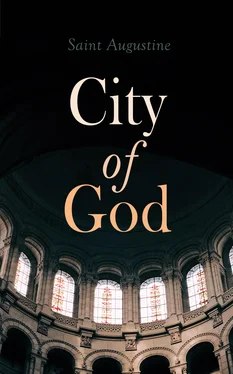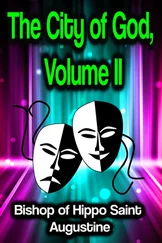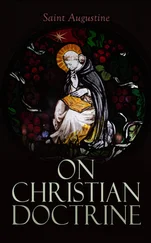Table of Contents
AUGUSTINE FIRST DISCUSSES THE DOCTRINE OF FATE, FOR THE SAKE OF CONFUTING THOSE WHO ARE DISPOSED TO REFER TO FATE THE POWER AND INCREASE OF THE ROMAN EMPIRE, WHICH COULD NOT BE ATTRIBUTED TO FALSE GODS, AS HAS BEEN SHOWN IN THE PRECEDING BOOK. AFTER THAT, HE PROVES THAT THERE IS NO CONTRADICTION BETWEEN GOD'S PRESCIENCE AND OUR FREE WILL. HE THEN SPEAKS OF THE MANNERS OF THE ANCIENT ROMANS, AND SHOWS IN WHAT SENSE IT WAS DUE TO THE VIRTUE OF THE ROMANS THEMSELVES, AND IN HOW FAR TO THE COUNSEL OF GOD, THAT HE INCREASED THEIR DOMINION, THOUGH THEY DID NOT WORSHIP HIM. FINALLY, HE EXPLAINS WHAT IS TO BE ACCOUNTED THE TRUE HAPPINESS OF THE CHRISTIAN EMPERORS.
PREFACE.
Since, then, it is established that the complete attainment of all we desire is that which constitutes felicity, which is no goddess, but a gift of God, and that therefore men can worship no god save Him who is able to make them happy,—and were Felicity herself a goddess, she would with reason be the only object of worship,—since, I say, this is established, let us now go on to consider why God, who is able to give with all other things those good gifts which can be possessed by men who are not good, and consequently not happy, has seen fit to grant such extended and long-continued dominion to the Roman empire; for that this was not effected by that multitude of false gods which they worshipped, we have both already adduced, and shall, as occasion offers, yet adduce considerable proof.
1. That the cause of the Roman empire, and of all kingdoms, is neither fortuitous nor consists in the position of the stars. 184
The cause, then, of the greatness of the Roman empire is neither fortuitous nor fatal, according to the judgment or opinion of those who call those things fortuitous which either have no causes, or such causes as do not proceed from some intelligible order, and those things fatal which happen independently of the will of God and man, by the necessity of a certain order . In a word, human kingdoms are established by divine providence. And if any one attributes their existence to fate, because he calls the will or the power of God itself by the name of fate, let him keep his opinion, but correct his language. For why does he not say at first what he will say afterwards, when some one shall put the question to him, What he means by fate ? For when men hear that word, according to the ordinary use of the language, they simply understand by it the virtue of that particular position of the stars which may exist at the time when any one is born or conceived, which some separate altogether from the will of God, whilst others affirm that this also is dependent on that will. But those who are of opinion that, apart from the will of God, the stars determine what we shall do, or what good things we shall possess, or what evils we shall suffer, must be refused a hearing by all, not only by those who hold the true religion, but by those who wish to be the worshippers of any gods whatsoever, even false gods. For what does this opinion really amount to but this, that no god whatever is to be worshipped or prayed to? Against these, however, our present disputation is not intended to be directed, but against those who, in defence of those whom they think to be gods, oppose the Christian religion. They, however, who make the position of the stars depend on the divine will, and in a manner decree what character each man shall have, and what good or evil shall happen to him, if they think that these same stars have that power conferred upon them by the supreme power of God, in order that they may determine these things according to their will, do a great injury to the celestial sphere, in whose most brilliant senate, and most splendid senate-house, as it were, they suppose that wicked deeds are decreed to be done,—such deeds as that if any terrestrial state should decree them, it would be condemned to overthrow by the decree of the whole human race. What judgment, then, is left to God concerning the deeds of men, who is Lord both of the stars and of men, when to these deeds a celestial necessity is attributed? Or, if they do not say that the stars, though they have indeed received a certain power from God, who is supreme, determine those things according to their own discretion, but simply that His commands are fulfilled by them instrumentally in the application and enforcing of such necessities, are we thus to think concerning God even what it seemed unworthy that we should think concerning the will of the stars? But, if the stars are said rather to signify these things than to effect them, so that that position of the stars is, as it were, a kind of speech predicting, not causing future things,—for this has been the opinion of men of no ordinary learning,—certainly the mathematicians are not wont so to speak, saying, for example, Mars in such or such a position signifies a homicide, but makes a homicide. But, nevertheless, though we grant that they do not speak as they ought, and that we ought to accept as the proper form of speech that employed by the philosophers in predicting those things which they think they discover in the position of the stars, how comes it that they have never been able to assign any cause why, in the life of twins, in their actions, in the events which befall them, in their professions, arts, honours, and other things pertaining to human life, also in their very death, there is often so great a difference, that, as far as these things are concerned, many entire strangers are more like them than they are like each other, though separated at birth by the smallest interval of time, but at conception generated by the same act of copulation, and at the same moment?
2. On the difference in the health of twins.
Cicero says that the famous physician Hippocrates has left in writing that he had suspected that a certain pair of brothers were twins, from the fact that they both took ill at once, and their disease advanced to its crisis and subsided in the same time in each of them.185 Posidonius the Stoic, who was much given to astrology, used to explain the fact by supposing that they had been born and conceived under the same constellation. In this question the conjecture of the physician is by far more worthy to be accepted, and approaches much nearer to credibility, since, according as the parents were affected in body at the time of copulation, so might the first elements of the fœtuses have been affected, so that all that was necessary for their growth and development up till birth having been supplied from the body of the same mother, they might be born with like constitutions. Thereafter, nourished in the same house, on the same kinds of food, where they would have also the same kinds of air, the same locality, the same quality of water,—which, according to the testimony of medical science, have a very great influence, good or bad, on the condition of bodily health,—and where they would also be accustomed to the same kinds of exercise, they would have bodily constitutions so similar that they would be similarly affected with sickness at the same time and by the same causes. But, to wish to adduce that particular position of the stars which existed at the time when they were born or conceived as the cause of their being simultaneously affected with sickness, manifests the greatest arrogance, when so many beings of most diverse kinds, in the most diverse conditions, and subject to the most diverse events, may have been conceived and born at the same time, and in the same district, lying under the same sky. But we know that twins do not only act differently, and travel to very different places, but that they also suffer from different kinds of sickness; for which Hippocrates would give what is in my opinion the simplest reason, namely, that, through diversity of food and exercise, which arises not from the constitution of the body, but from the inclination of the mind, they may have come to be different from each other in respect of health. Moreover, Posidonius, or any other asserter of the fatal influence of the stars, will have enough to do to find anything to say to this, if he be unwilling to impose upon the minds of the uninstructed in things of which they are ignorant. But, as to what they attempt to make out from that very small interval of time elapsing between the births of twins, on account of that point in the heavens where the mark of the natal hour is placed, and which they call the "horoscope," it is either disproportionately small to the diversity which is found in the dispositions, actions, habits, and fortunes of twins, or it is disproportionately great when compared with the estate of twins, whether low or high, which is the same for both of them, the cause for whose greatest difference they place, in every case, in the hour on which one is born; and, for this reason, if the one is born so immediately after the other that there is no change in the horoscope, I demand an entire similarity in all that respects them both, which can never be found in the case of any twins. But if the slowness of the birth of the second give time for a change in the horoscope, I demand different parents, which twins can never have.
Читать дальше












